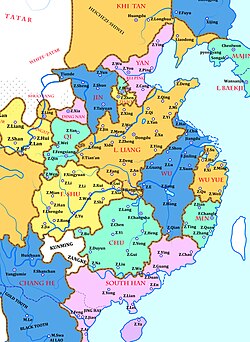Wu 吳 | |||||||||
|---|---|---|---|---|---|---|---|---|---|
| 907–937 | |||||||||
 | |||||||||
| Capital | Guangling | ||||||||
| Common languages | Middle Chinese | ||||||||
| Government | Monarchy | ||||||||
| Prince/King/Emperor | |||||||||
• 907–908 | Yang Wo | ||||||||
• 908–921 | Yang Longyan | ||||||||
• 921–937 | Yang Pu | ||||||||
| Historical era | Five Dynasties and Ten Kingdoms period | ||||||||
• Foundation of the State of Wu under Tang rule | 902 | ||||||||
• Fall of the Tang dynasty | June 1 907 | ||||||||
• Yang Longyan proclaimed himself King and inaugurated a new era name | 919 | ||||||||
• Yang Pu acceded the throne as Emperor | November 29, 927 | ||||||||
• Ended by the Southern Tang | 937 | ||||||||
| Currency | |||||||||
| |||||||||
| Today part of | China | ||||||||
Wu (吳), also referred to as Huainan (淮南), Hongnong (弘農), Southern Wu (南吳), or Yang Wu (楊吳), was a dynastic state of China and one of the Ten Kingdoms during the Five Dynasties and Ten Kingdoms period. It existed from 907 to 937 with capital at Jiangdu Municipality (江都; modern-day Yangzhou, Jiangsu Province).
Some historians consider Wu to have begun in 902, when Yang Xingmi was named Prince of Wu by the Tang dynasty. All three rulers of Wu after 907 (when the Tang dynasty collapsed and Zhu Wen established the Later Liang dynasty) were Yang Xingmi's sons. The first ruler Yang Wo was murdered by his ministers Xu Wen and Zhang Hao, and his two brothers after him were effectively puppets dominated by Xu Wen at first, and later Xu Wen's adopted son Xu Zhigao (Li Bian) who in 937 usurped power to establish the Southern Tang dynasty. Yang Pu, the last ruler, was the only one to claim the title of emperor; the other rulers were kings or princes.